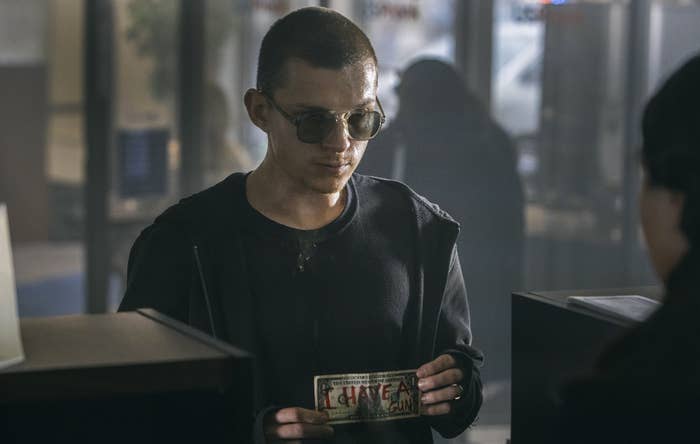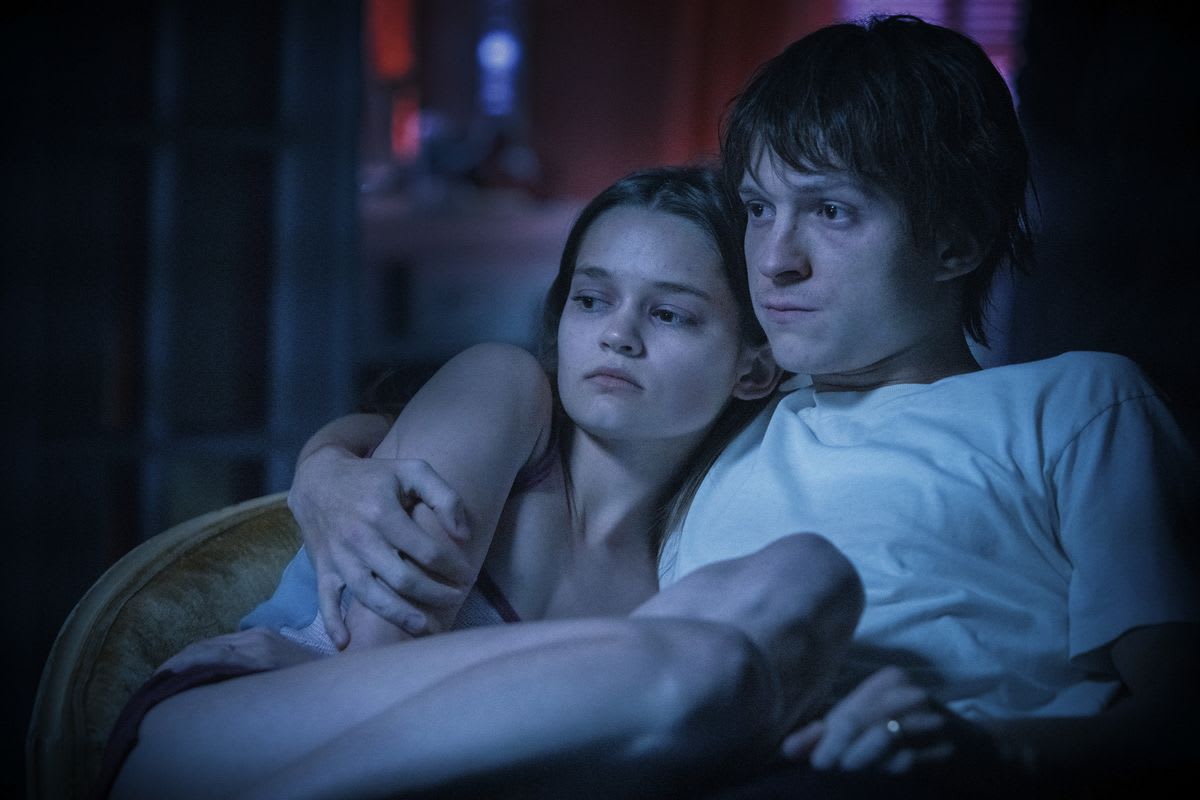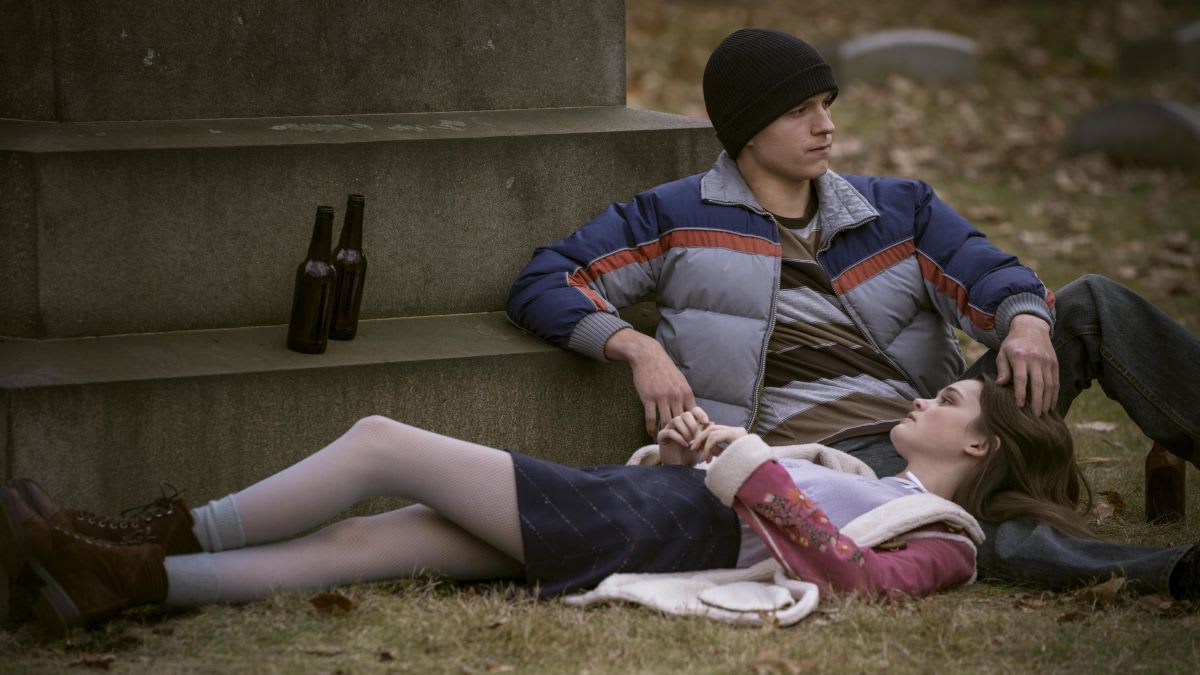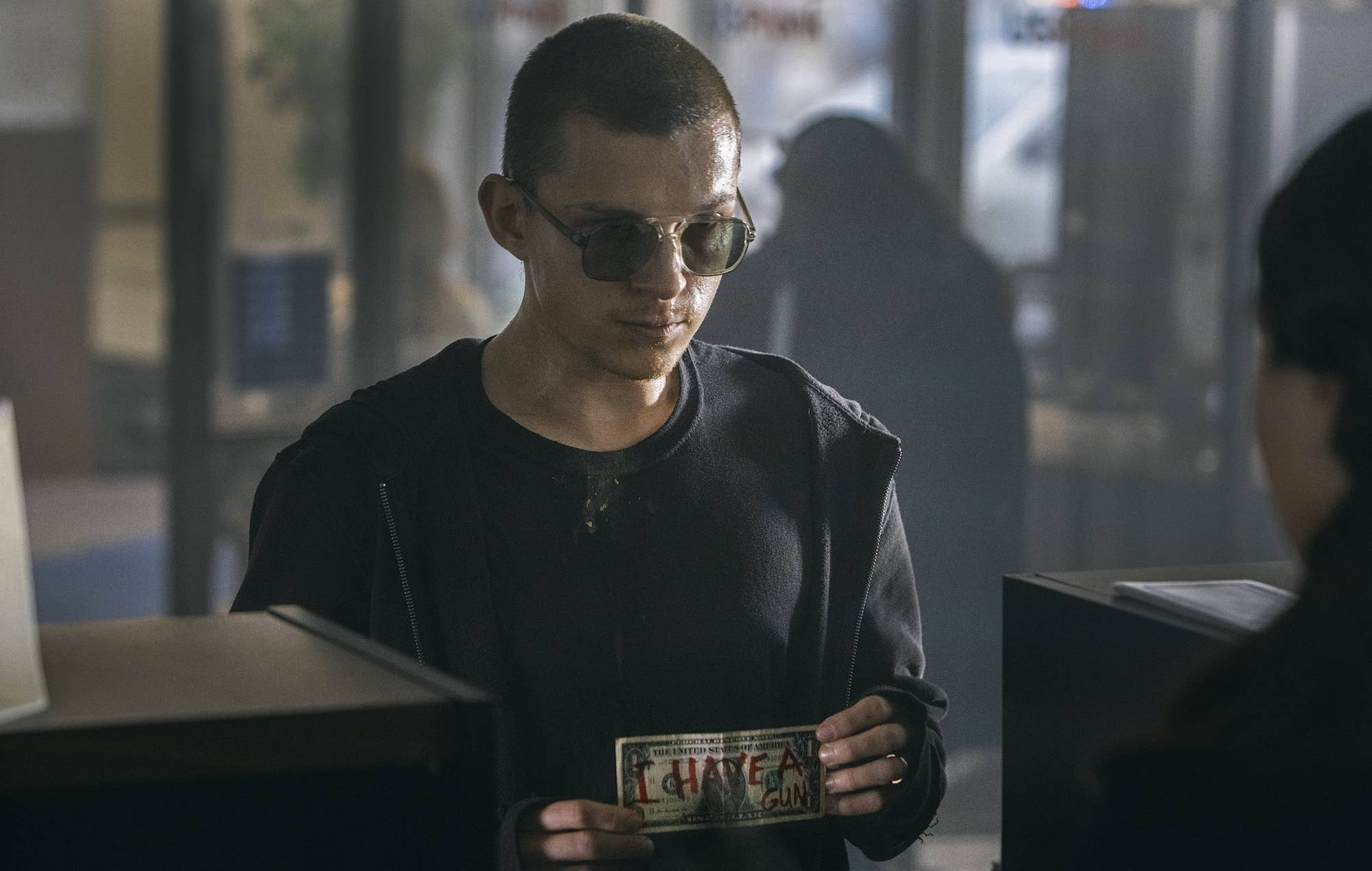
Cherry has a lot riding on its release. The Apple TV+ movie is an adaptation of one the most well-reviewed debut novels in recent memory, a way for Avengers: Infinity War and Endgame directors Anthony & Joe Russo to define their careers post-Marvel, a high-profile “serious” role for Spider-Man actor Tom Holland, a huge play for a streaming service still working to find itself, and a late-season awards contender. The burden of expectation for Cherry is considerable, so it’s not unsurprising—yet still disappointing—the movie largely crumbles under its own weight.
Published in 2018 by Nico Walker, Cherry is an autobiographical novel in which an unnamed protagonist (assumed to be Walker himself, but never officially confirmed) heads to Iraq during the aughts as an Army medic. Traumatized and depressed by his experience, the narrator begins abusing oxycodone before developing a heroin addiction, a habit he funds by robbing banks. Under Walker’s unique prose and authentic voice, Cherry paints a mean, searing picture of how American society has chewed up and spit out the young white men it already doesn’t care about by putting them into a meaningless war and leaving them with no reprieve from the resulting madness—outside of opioids. The book is rarely a fun read, yet it is a profoundly compelling and important one.
Any book as splashy as Cherry instantly makes it ripe for adaptation, but I always wondered if the Russo Brothers were the right candidates for the job. In some respects, they are; coming off of Endgame, the directing duo had a considerable influence to leverage to get projects made. Understandably, the two might want to go with more of a character-focused piece after the epic scale of Infinity War and Endgame, and getting something as nasty as Cherry made is easier to accomplish when you’ve directed two of the biggest movies of all time.
However, from the second Cherry opens, it feels too polished and too big-budget-y for something as dirty, DIY, gnarly, and gritty as Walker’s book. In their attempt to translate Walker’s gonzo first-person style, the Russo Brothers end up incorporating a bunch of different techniques cherrypicked from other directors who’ve executed them better. Think Scorsese-inspired narration, Tarantino-style chapter breaks, Scott Pilgrim-like word overlays, fourth-wall breaks, and so forth. These techniques don’t do the movie any favors, especially when the film’s story starts to feel like a lot of other coming-of-age, war, and drug tales we’ve seen on screen before—only this time, each one of those genres gets stitched together into a single 140-minute movie. These choices make Cherry feel overwrought, too stylized, and too messy. I understand what the Russos were aiming for—each chapter wants to have its own style—but the result feels too scattered. The duo nailed the action sequences; the Iraq War’s intensity and the bank robberies feel appropriately intense, bolstered by Three Kings cinematographer Newton Thomas Sigel’s steady hand.

Cherry’s script, credited to Angela Russo-Otstot (sister of the directors) and Jessica Goldberg, has the nearly impossible task of stitching all of these elements (the period spans over a decade) into a cohesive piece. Sadly, this ends up shortchanging some of the overall impact. The movie, for efficiency’s sake, speeds the addiction process along. At the end of the third section, he’s abusing oxy, and then at the start of the fourth, he’s fully in the throes of his heroin addiction. It’s a stark contrast compared to the book, where Walker goes out of his way to describe his descent into the heart of darkness, accenting the highs of the high and the lows of bottoming out in a way that the movie doesn’t quite capture, despite its best attempts. It’s too fast, ultimately shortchanging the overall effectiveness of the journey in the process. Furthermore, Cherry wraps up with a Hollywood ending that’s inherently antithetical to Walker’s conclusion. The book doesn’t put the reader in a position to pity Walker’s protagonist—there’s certainly no sympathy for his self-created devil—and so the storybook of the movie’s conclusion rings hollow.
For as disappointed as I am about the mechanics of the book-to-film adaptation, the Russos nailed it with the casting of Tom Holland as their lead. The actor is clearly looking to broaden his talents outside of the MCU, and Cherry certainly fits the bill when it comes to doing a 180. Holland is so well-known for Spider-Man’s heroism that this perception works to the movie’s advantage in selling that stark transition. It’s a clever bit of shorthand, leveraging the audience’s pre-convinced idea of an actor to sell a radically different role. Still, Holland excels and proves he’s more than just your friendly-neighborhood-wallcrawler as he commands the screen at every turn, grounding the movie in a real way when it threatens to go off the rails. Cherry arguably cements Holland as the must-watch young male movie star actor of the moment, even more so than some of his contemporaries—and I can’t wait to see what kind of roles he’ll continue to take. As good as he is, however, I have a feeling he’ll be shutout from what’s turned into quite an exciting awards season.

Cherry is inherently Holland’s story, which means that Wayne star Ciara Bravo gets the short end of the stick. As Emily, the movie’s love interest and wife role, she’s sadly left to play second-fiddle to Holland and doesn’t get the same depth and breadth he’s afforded. Bravo does try to make the best with what she’s got, and I hope this movie can be used as a springboard to give her a more sizeable and meaningful project in the future. It’s not just Bravo, as all the supporting roles feel light compared to Holland, including bit parts from Midsommar’s Jack Reynor and Michael Gandolfini (son of Tony Soprano himself).
Cherry doesn’t feel like the quality awards bait-y title Apple TV+ needs to make an impact in an already crowded streaming field; it’s not the post-Endgame victory lap the Russos hoped for, nor does it feel like the deeply personal project they claim it is. Instead, the movie is too over-produced and too self-aggrandizing to be an accurate reflection of what made Walker’s novel so compelling and personal in the first place. Instead, the final product feels reflective of what so typically happens when Hollywood gets its hand on a hot story; something that felt so special and unique on the page feels inherently lesser on the screen.


